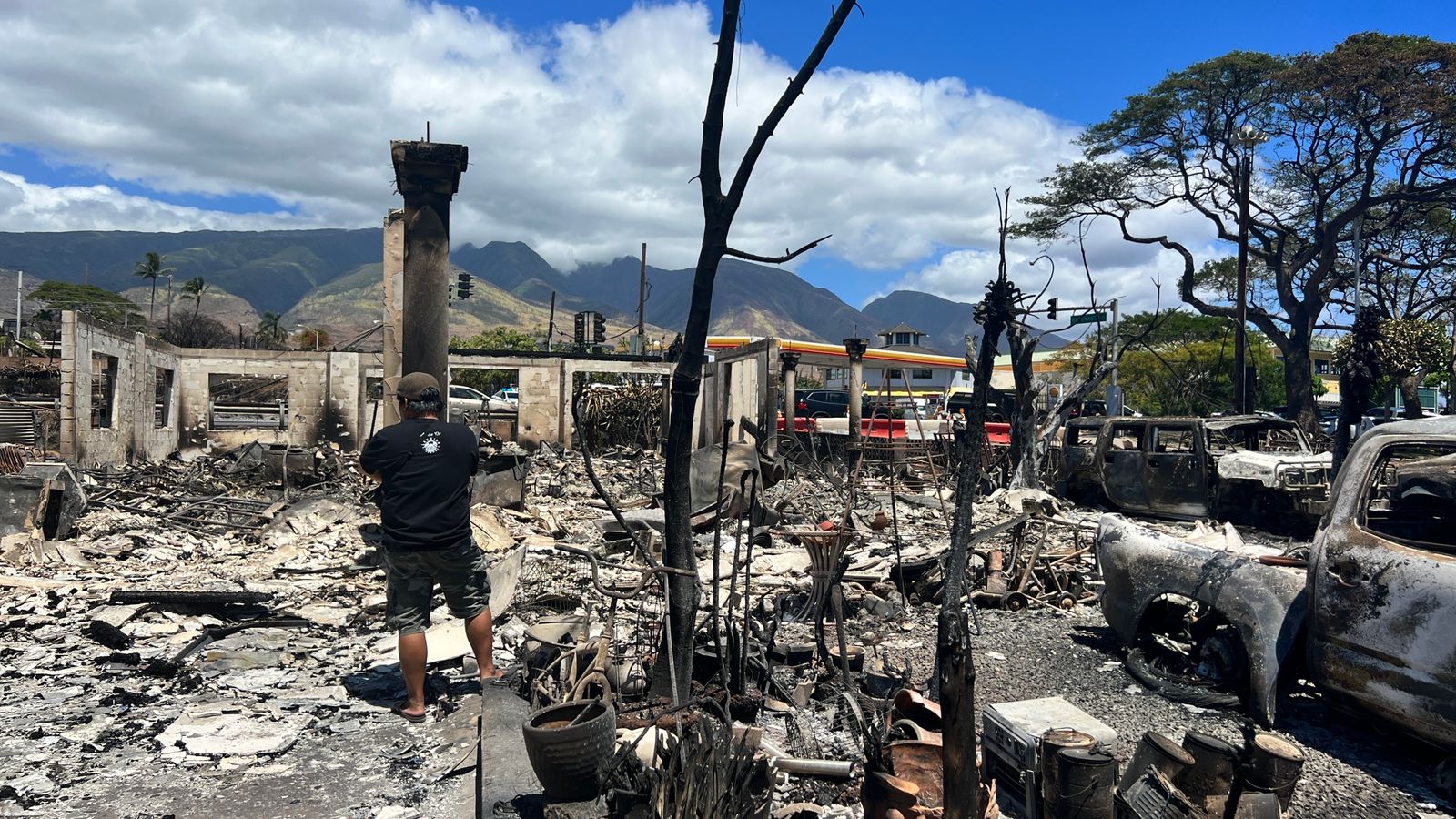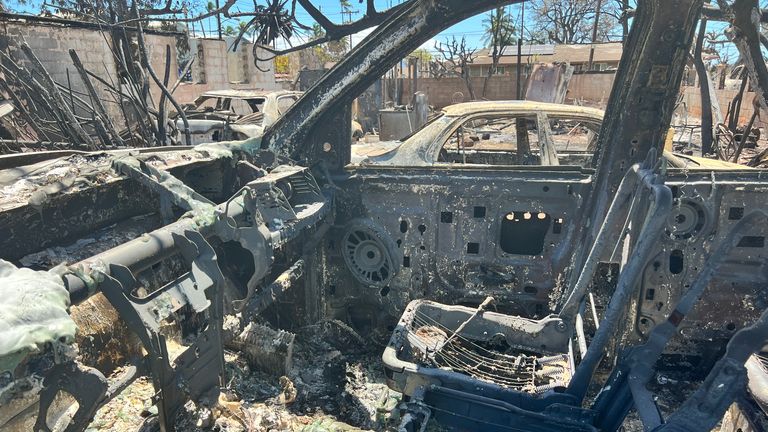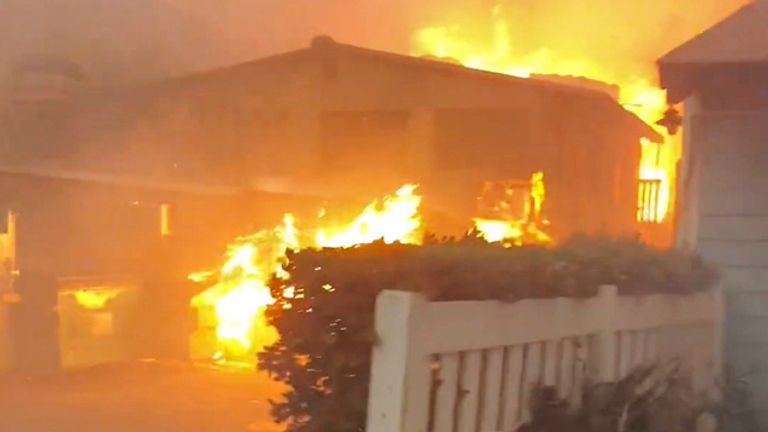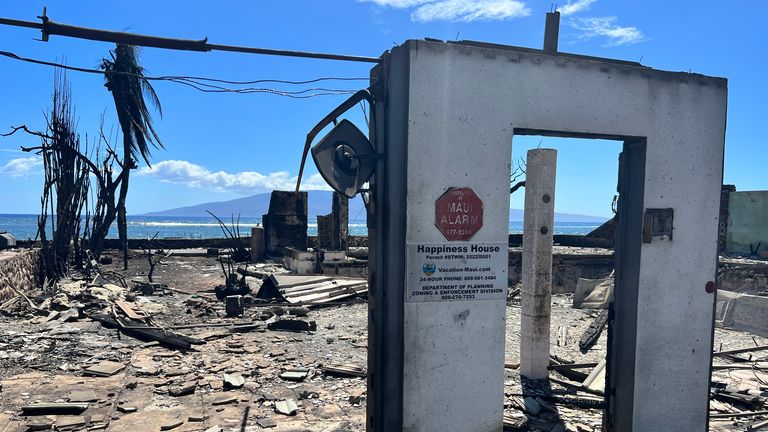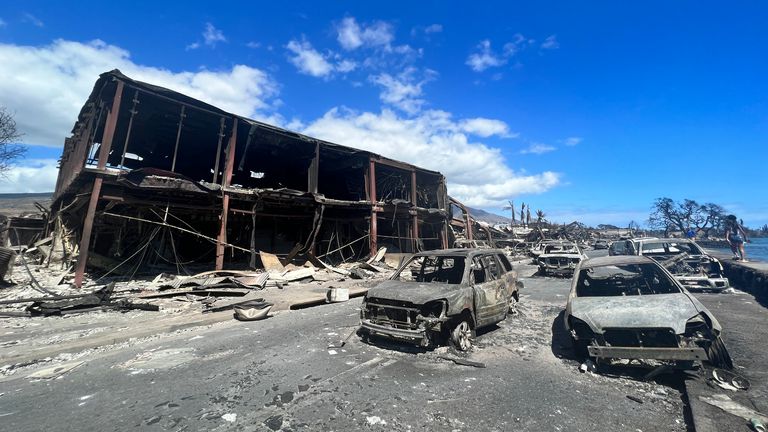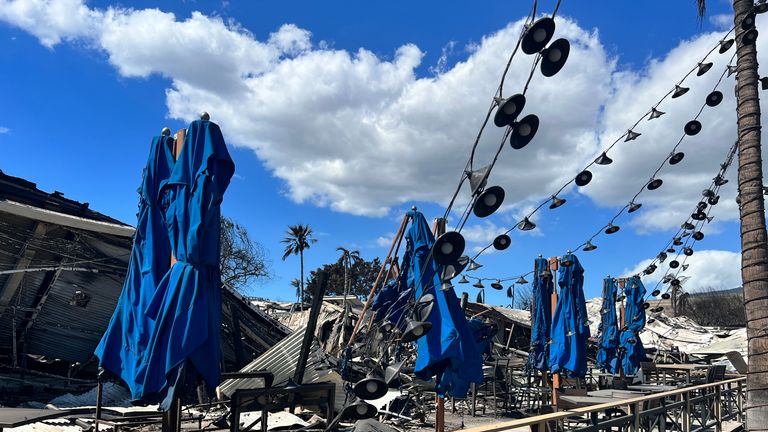It was the first time the people of Lahaina had been allowed to return since wildfires laid ruin to their town three days ago.
A queue of cars, hours long, waited at the police checkpoint to show their documents.
Once cleared, they travelled the winding highway, under a tunnel cutting through the lush west Maui mountains and into town. Some were on mopeds, others in the back of pick-up trucks, wind whipping as they passed a series of picture postcard beaches.
They had been told to brace themselves for the scale of the devastation. But for many, what awaited them on arrival was even worse than they expected.
Front Street had been the beating heart of Lahaina, full of cafes selling shaved ice, hip bars and well regarded restaurants. But it wasn’t just a tourist town, it was an idyll for 13,000 locals.
Ryan Nakagowa has lived here his whole life and returns with his family to see the damage on the ground. They’re wearing masks to protect themselves from the acrid smoke filling the air. Much of the wreckage is still smouldering.
“It really feels like a bomb has been dropped,” he says, “I feel like if you pinched me right now and I would wake up, probably better off. But this is the reality, unfortunately.”
Mr Nakagowa is wrestling with how to tell his five-year-old daughter that her school has burned down.
Meanwhile, his sister Natalie is reminiscing.
Read more:
Deadliest natural disaster since it became a US state
‘Jump in the water or burn’ – locals describe escape
Is climate change behind devastation?
“Everyone who came here, it was their happy place,” she says, “And now everything we know is gone. I can’t go to the gelato shop anymore.
“I can’t go to the bars we used to go to. There was bingo nights and trivia nights and such a big sense of community. Although we still have that sense of community, it’s not going to be the same for a while.”
There is little joy to be found in the ruins but Natalie tries. “Want to see what the top-rated trip advisor restaurant in Hawaii looks like?” she asks, pointing to a pile of twisted metal.
A bar owned by rocker Mick Fleetwood, of Fleetwood Mac, is still standing but has been torched, charcoal black on the outside and hollowed inside.
The fire that obliterated Lahaina was hot enough to turn metal into molten silver lava which now decorates the roads. In the ruins of what was the art gallery, a statue of an elephant and a model whale have survived.
‘Everything we had in the past is gone’
Down the street, sisters Christie Gagala and Abigail Ang are sifting through the remains of a place they have called home for almost two decades. Their dad built it and they lived here with 16 family members. They sob as they realise there is little to be retrieved.
“We lost everything,” says Christie, “thank God we still have each other and we’re all alive and safe and accounted for. We’re the only things we have now, because everything that we had in the past is gone.”
The US Army goes from house to house, searching the debris, marking the pavement with a spray painted orange cross once a search in completed.
Questions are mounting for authorities about their response to the wildfires. There is an outdoor emergency alert system on Maui, designed for circumstances like this but, for whatever reason, it was not activated on Tuesday afternoon.
“I hear there were no sirens that went off,” says Charles Offenbach, a local who lost his home in the fire, “We just had to know that ourselves. It was fight or flight with no warning whatsoever. And it spread in the matter of minutes.”
Some ran out of time. Near the harbour, the scene is apocalyptic. The shells of dozens of burnt out cars are moody against the sparkling, turquoise ocean. The occupants, it seems, abandoned their vehicles and jumped into the sea when they were unable to escape the flames by road.
Annelise Cochran was in the water for six hours with her neighbour, Edna. Burns from the flames cover her face.
“We were going in and out of consciousness,” she says, “we were hallucinating and holding hands and telling each other to wake up. Every once in a while we would get out of the water or go back up towards the fire just to warm our bodies.”
She, too, thinks the authorities were ill prepared. “There was no warning,” she says, “I was not told a single thing, I got no message, no alarm, nobody told me my house would be burned down or that my friends will be dying in front of me. And I understand that there’s no power, but that’s what an emergency system is for.”
As the number of dead rises by the day, the sense of loss swells and so too does the scrutiny of the response.
